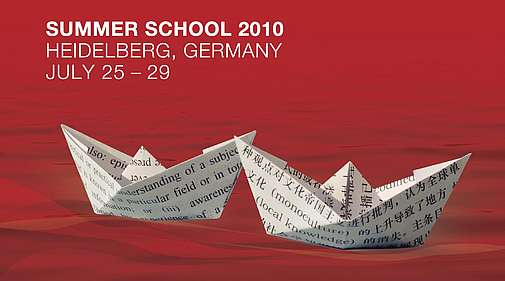Archive



Knowledge on the Move:
Circulation, Domestication and Transcultural Reconfigurations
Karl Jaspers Centre for Advanced Transcultural Studies, Heidelberg
July 25 to 29, 2010
Coordinator: Joachim Kurtz, Professor of Intellectual History
Concept
The
Summer School 2010 of the Cluster “Asia and Europe” examines the
multifaceted encounters between Asian and European knowledge since the
early modern period. It takes as its starting point the premise that
knowledge is never a mere commodity. Perspectives on its meaning,
value, uses, and capacities undergo frequent shifts and are almost
always contested. Thus, knowledge can become an object of desire,
indifference, or revulsion. As such, it is appropriated, exploited,
domesticated, molded, ignored, or rejected by concrete agents acting in
specific circumstances; at the same time, it is embedded in larger
structures of power, habitus, and convention that it helps to
legitimate, stabilise, or subvert.
Knowledge travels in multiple
ways. Most conspicuously, it is transported and shared, voluntarily or
involuntarily, by traders, migrants, missionaries, itinerant scholars,
pilgrims, professionals, and other individuals or groups that cross
boundaries of language and culture; it also moves as encoded in texts,
attached to objects, or embodied in social and cultural practices. When
on the move, knowledge becomes a site of multilayered and extended
negotiations that affect both the contexts of its arrival and departure
in unexpected, and often, unintended ways.
Efforts to reinscribe
knowledge on the move into historical narratives are only beginning to
gain momentum. Scholars from diverse disciplinary backgrounds are
reexamining the tortuous routes along which learning has travelled, and
the diverse ways in which it was transformed, refused, hybridised, or
domesticated in the process. Distinguished representatives of these new
and exciting directions will lecture and conduct seminar sessions at
the Summer School, focusing on themes such as geographies of knowledge;
networks, agents and pathways; knowledge and translation; and media of
circulation.
A special section will introduce new techniques of
presenting transcultural histories of science and thought through
digital storytelling, podcasts, or short films.
The following questions will be at the centre of discussion:
- How is knowledge transformed on its way through different regions, cultures, polities, and languages?
- What is lost, or gained, in translation?
- How do new categories, ideas and practices react with local knowledge, and in what ways do they contribute to reshaping views of emic practices and learning?
- How can we conceptualise migrations of knowledge in a new historical epistemology without reducing their complexity or denying their dynamics?
- And how can we combine studies of the structural constraints, such as asymmetries of power, capital, and influence that shape such movements with richly textured accounts of individual agency and creativity?
What kind of programme is being prepared...
The summer school course programme spans over four days and combines insights in the research of renowned experts in the form of lectures with more interactive elements such as seminars and workshops. The scholars represent a wide range of backgrounds in line with the Cluster's own focus on interdisciplinary research.
Read more about the programme...
Application
The Summer School 2010 addresses graduate students interested in circulations of knowledge between Asia and Europe in a broad range of disciplines, including the history of science, thought, technology and art, sociology, philosophy and anthropology as well as East, South and Southeast Asian Studies.
Applications (download the application form here...
(PDF, 104kb)) should be accompanied by a letter explaining your field
of interest and the reason you wish to attend the Summer School. The
application form and the letter are to be sent electronically to summerschool@asia-europe.uni-heidelberg.de, latest by May 31, 2010.
The course fee for participation at the Summer School is 250 Euro and covers the following:
- Lecture and seminar programme
- Reception dinner on first evening
- Lunch, coffee and cold drinks during the course
- Local sightseeing programmes
Participants
will be expected to arrange for their own travel and accommodation at
Heidelberg for the duration of the course. However, the Cluster team is
happy to provide advice and a comprehensive list of accommodation
possibilities and prices.
For queries and further information, please contact the summer school organisation team at summerschool@asia-europe.uni-heidelberg.de.


